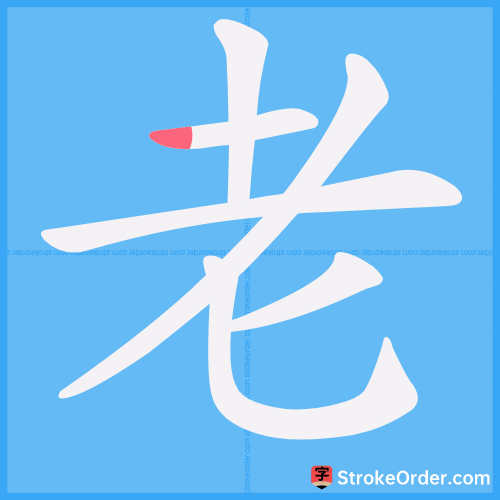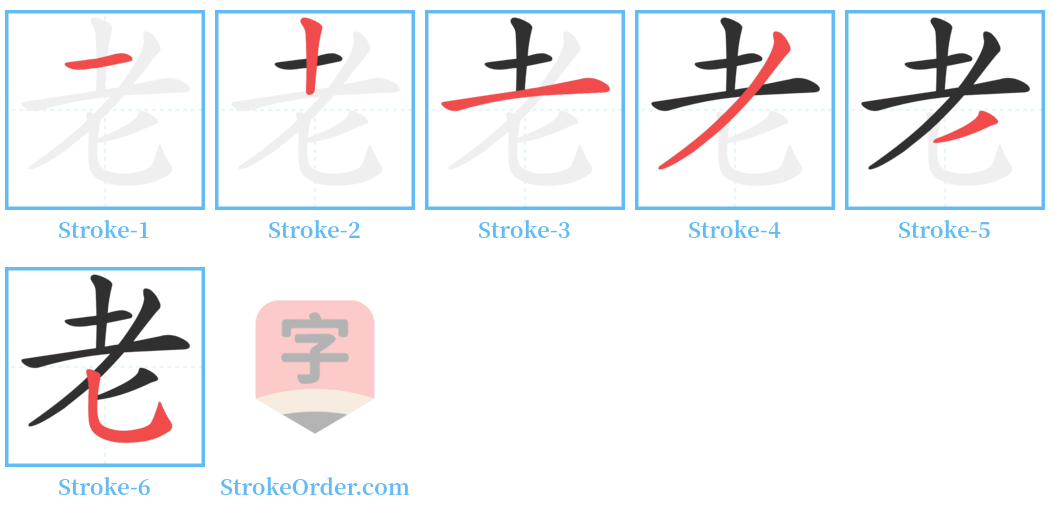老 Stroke Order
Animated Stroke Order of 老

Stroke Order Diagrams for 老

Step-by-Step Handwriting Guide for 老

Learn to Write Chinese Characters with Video Tutorials
Watch the video of writing the Chinese character "老", learn the correct stroke order (笔顺) of the character "老", and master the standard way of writing the character "老".
Free Printable Handwriting Practice with Stroke Order: 老
Printable Writing Practice Worksheet of "老" in Portrait Orientation (Tian Zi Ge)

Printable Writing Practice Worksheet of "老" in Landscape Orientation (Tian Zi Ge)

Information of 老
Pinyin
lǎo
Radical
耂
Strokes
6 strokes
Usage
★★★★★
Definition
(a prefix used before the surname of a person or a numeral indicating the order of birth of the children in a family to indicate affection or familiarity) / old (of people)
老 (lǎo)
Meaning:
1. 年纪大,时间长,有经验,陈旧的。
Old; long-standing; experienced; outdated.
2. 对年纪大的人的尊称。
A respectful title for older people.
3. 极,很。
Extremely; very.
4. 老年人。
Elderly person.
5. 晚年。
Old age.
6. 敬老,养老。
Respect for the elderly; caring for the elderly.
7. 总是,经常。
Always; often.
8. 原来的。
Original; former.
9. 与“嫩”相对。
Opposite of "嫩" (young or tender).
10. 词头,用于表排行,用于表相互尊称,或加在某些动植物名前构成多音节词。
A prefix used to indicate ranking or mutual respect, or to form polysyllabic words when added before certain nouns (like plants or animals).
11. 老子(中国先秦思想家)及其学说的简称。
Abbreviation for Laozi (the ancient Chinese philosopher) and his philosophy.
12. 死的讳称。
A euphemism for death.
13. 〔~板〕指业主或企业的经营者。
Refers to an owner or operator of a business.
14. 姓。
A surname.
---
1. 年纪大,时间长,有经验,陈旧的:老当益壮。老朋友。老练。老化。少年老成。老马识途。
Old, long-standing, experienced, outdated: "The older one is, the stronger one becomes." Old friends. Experienced. Aging. ("A child is wise beyond their years.") An old horse knows the way.
2. 对年纪大的人的尊称:吴老。老人家。老大爷。
A respectful title for older individuals: Mr. Wu. Old timer. Old grandpa.
3. 极,很:老早。老羞成怒。
Extremely; very: Very early. Extremely angry.
4. 老年人:敬老院。扶老携幼。老有所为。
Elderly person: Elderly care home. Helping the elderly while raising children. The elderly should have opportunities to contribute.
5. 晚年:老年。老境。
Old age: (the) later years. (the) situation of the elderly.
6. 敬老,养老:“老吾老,以及人之老。”
Respect for the elderly, caring for the elderly: "Respect my elders and also others' elders."
7. 总是,经常:老是生病。
Always; often: Always getting sick.
8. 原来的:老地方。
Original: the old place.
9. 与“嫩”相对:黄瓜长老了。
Opposite of "嫩": The cucumber is overgrown.
10. 词头,用于表排行,用于表相互尊称,或加在某些动植物名前构成多音节词:老大。老鹰。老倭瓜。
A prefix used for ranking or mutual respect, or added to form polysyllabic words with certain plants or animals: eldest. Old eagle. Old squash.
11. 老子(中国先秦思想家)及其学说的简称。
Abbreviation for Laozi (the ancient Chinese philosopher) and his philosophy.
12. 死的讳称:老了。
A euphemism for death: (He/She) has passed away.
13. 〔~板〕指业主或企业的经营者。
Refers to an owner or operator of a business.
14. 姓。
A surname.
---
老 (lǎo)
Definition:
- Shape: Old and aged.
Creation Method: Compounded character, originally resembling an elder holding a cane.
1. 五十至七十岁的高龄。
Old; aged (Referring to those aged fifty to seventy).
2. 历时长久。
Long-standing.
3. 娴熟,富有经验,阅历深。
Experienced.
4. 厚。
Thick.
5. 大。
Great.
6. 排行在最后的。
Youngest.
---
老 (lǎo)
Noun:
1. 老年;晚年。
Old age.
2. 老年人。
Old people; the aged.
3. 对先辈、年长者的尊称。
A respectful title for elders.
4. 对老人的尊称。
A respectful term for the elderly.
5. 敬词。多不表示年岁。
A term of respect, often not indicating age.
6. 自称。
A self-reference ("I").
7. 古时对某些臣僚的尊称。
A term of honor for certain officials in ancient times.
8. 指父母或兄长。
Referring to parents or older brothers.
9. 老子及其哲学的省称。
Abbreviation for Laozi and his philosophy.
10. 姓。
A surname.
---
老 (lǎo)
Verb:
1. 死的讳称。
A euphemism for death.
2. 敬爱,敬重。
Respect and love.
3. 告老。
To retire due to age.
4. 变老;衰老。
To become old; to age.
5. 衰老;衰颓。
Old and feeble; decrepit.
---
老 (lǎo)
Adverb:
1. 用在动词前面,表示某种动作、行为或状态在一段较长时间里一直持续不断发生或时常重复出现,有“经常”、“时常”的意思。
Used as a prefix before verbs to indicate ongoing or frequently repeated actions (meaning "always" or "often").
2. 用在形容词前面,表示程度深,相当于“很”、“极”。
Used before adjectives to indicate a strong degree, equivalent to "very."
3. 很久。
For a long time.
---
老 (lǎo)
Prefix:
1. 加在姓、名和某些称谓的前面。
Added before surnames, names, and certain titles.
2. 加在兄弟姐妹排行次序上。
Added to indicate the order of siblings.
3. 加在某些动植物名词前面。
Added before names of some plants and animals.
---
老 (lǎo)
Suffix:
Referring to people (with a sense of disdain). Also known as "佬".
For example: old farmer; old foreigner.
(coll.) father's father's mother / paternal great-grandmother / respectful form of address for an old woman
lit. old general / commander-in-chief 將帥|将帅, the equivalent of king in Chinese chess / fig. old-timer / veteran
(affectionate form of address for a male who is not very much younger than oneself) my boy / old pal
Input Method for 老
Pinyin
lao3
Wubi
ftxb
Cangjie
jkp
Zhengma
bmrr
Four Corner
44712
Unicode
U+8001
Same Pronunciation Characters